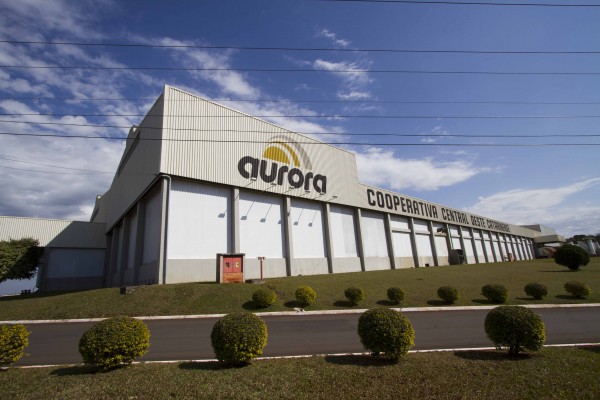Cooperativa Central Aurora Alimentos, from Chapecó (SC), the third largest food company in Brazil, had gross operating revenue of approximately R$22 billion in 2022, a result 13% higher than the previous year.
The surplus for the year was R$649.0 million, the cooperative reported in a statement.
In 2022, the domestic market accounted for 64.3% (R$14.1 billion) of gross operating revenue and absorbed 65.6% of production.
The foreign market contributed 35.7% (R$7.9 billion) of revenue and shipped 34.4% of production to more than 80 countries.
In 2022, Aurora established itself as the largest exporter of pork in Brazil: it accounted for 25.5% of Brazilian exports of the product.
In the poultry segment, the share was 7.2% of exports.
Total pig slaughter at the seven industrial plants grew 6.4% last year and reached 7.1 million heads.
The industrialization of pork meat increased 5.2% and reached 404 thousand tons; fresh production increased 10% and reached 686 thousand tons.
Aurora’s production chain is based on 3,642 integrated pig farmers in Santa Catarina, Rio Grande do Sul, Paraná and Mato Grosso do Sul.
In the poultry segment, Aurora slaughtered 288.5 million heads in its nine plants in 2022, an increase of 3% in relation to the total volume of birds slaughtered in 2021.
A network of 2,286 integrated poultry farmers constitute the production base in the states of Santa Catarina, Rio Grande do Sul and Paraná.
The fresh production of poultry meat was increased by 10.2% to 645 thousand tons. Industrialization increased by 7.6% to 58.4 thousand tons.
Aurora received 507.5 million liters of milk for industrial processing in 2022, a volume 8% lower than the previous year.
This raw material allowed, among other uses, the production of 216.6 thousand tons of industrialized products (an increase of 2.3%) in eight lines: dairy beverage, UHT milk, powdered milk, whey powder, cream, cheese bars, sliced cheese and cream cheese.
The line of industrialized pasta products – consisting of lasagnas, pizzas, cheese bread, sandwiches and ready meals – grew by 33.2% to 11.4 thousand tons.
Aurora’s president, Neivor Canton, said that several factors contributed to the good performance of exports.
Among them, he mentioned: the opening of the Canadian market to Brazilian pork (Aurora was the first Brazilian company to ship to that country); consolidation of the pork market in Japan; return of the Xaxim (SC) chicken unit’s accreditation to China; opening of the Mexican market for pork; first export of processed products to Paraguay; first container of pork cuts to India and the resumption of pork cuts exports to South Korea.
Aurora considered, however, that the increase in production costs, largely due to the difficulties caused by the interrelation of the environmental, economic and political crises, aggravated by the Russia-Ukraine war, disrupted the international supply chains, directly affecting Brazil.
The repercussions were felt in the shortage of containers, ships, corn and soybean meal (basic raw material for animal nutrition), as well as inputs for agriculture, additives, vitamins, enzymes, amino acids, etc.
The conflict disrupted the global economy, caused an energy crisis in Europe and contributed to the rise in inflation in the United States, China, the United Kingdom and the Eurozone.
In this context, according to the president, it was inevitable that relevant factors would impact the performance of essential areas, such as agriculture (lower availability of chicks on the market), logistics (adjustments in freight costs caused by the increase in fuel prices, especially diesel), industry (lower milk collection, labor shortages and low commercial demand for industrialized items), administration (significant increase in the interest rate charged by the market) and the commercial area (repressed demand for value-added items).
2023 Projections
The president of Aurora believes that 2023 will be another challenging year as a result of lower growth in China, a possible recession in Europe and North America and the “persistently high” costs of the main inputs – especially corn and soybeans.
He assured, however, that production levels will be maintained to preserve jobs, maintain the sustainability of the broad production chains (pig farming, poultry farming and dairy farming), contribute to the country’s food security and generate surpluses in the trade balance.
The Cooperative will continue with the investment plan that has been implemented for three years.
The largest portion of the investment program – estimated at R$1.082 billion for 2023 – is geared towards increasing production capacity, followed by meeting legal requirements, maintaining capacity and innovation, as well as improvements and enhancements in the areas of quality, safety and occupational health.
Source: Canal Rural

